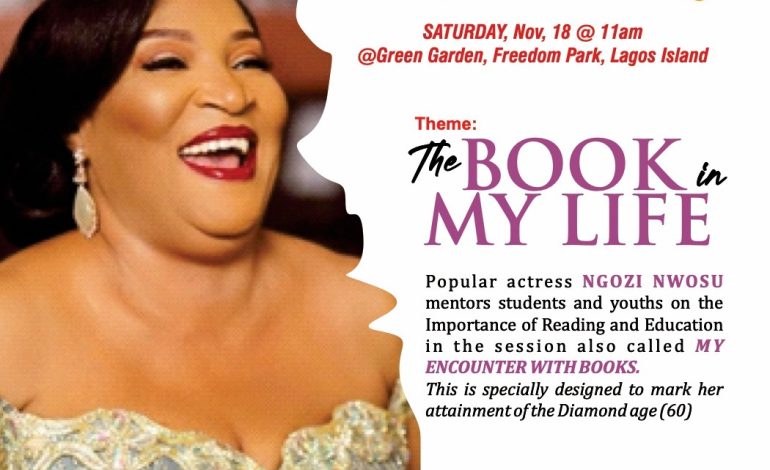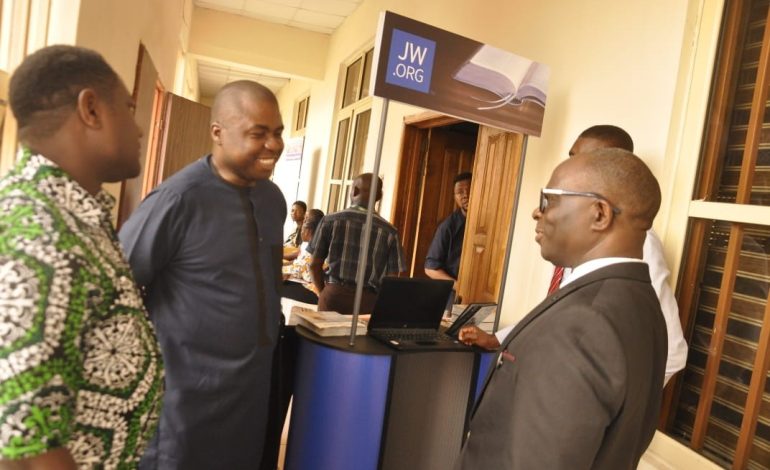Stakeholders send ‘Memo to Ministry of Arts, Culture and Creative Economy’ as LABAF 25:0 opens today

* It’s ‘War Without End’ as Biafran Narratives pepper Friday colloquium
* RMD, Ngozi Nwosu narrate their encounters with books to youths @LABAF 2023
By Godwin Okondo
A NEW sheriff is in town for the arts and culture sector in the form of Hannatu Musawa. Over the years, the sector has seen itself as an orphan and has existed more without government’s support. How then will Musawa be different from her predecessors, particularly Lai Mohammed, who showed utter disdain for the sector and promised Covid-19 palliatives that never came? What will the addition of the ‘creative economy’ appellation attached to the ministry’s name change about the ministry’s failure over the years? Will government now be genuinely interested in the wellbeing of the sector? Over five months on, nothing suggests there will be a change of attitude from the ministry that supposedly supervises unarguably a sector believed to be the largest employer of labour.
These will form the thrust of the memo stakeholders will send to Madam Musawa on the closing day of the 25th edition of Lagos Book & Art Festival 2023 on Sunday, November 19, 2023. Stakeholders in the culture sector will dissect the current state of the Nigerian creative economy sector and offer blueprints on how the sector could tap into local and global resources to maximize gains and opportunities. It will feature heads of artists’ organisations, guilds, cohorts, advocates, and activists. It is the Festival’s Plenary Wrap-up.
And as lovers of books and everything culture make the yearly pilgrimage to Freedom Park, Lagos, starting from today, Monday, November 13, 2023, for the weeklong Lagos Book & Art Festival (LABAF) celebration, one remarkable focal point will be the high-profile conversations, provocative themes and the exciting books to be discussed. The festival’s theme ‘The Reset: History and the Darkling Plain’ is the starting point, which is also part title for Ken Saro-Wiwa’s book on the never-ending Nigerian Civil War that still rages in the minds of most Nigerians, not least was Nigeria’s last ruler, Muhammadu Buhari.
Saturday, November 18 will give the festival audience opportunity to engage two books on the civil war being closely examined in a colloquium entitled ‘Biafran Narratives: War Without End’. It will feature readings and conversations on Ken Saro-Wiwa book On a Darkling Plain and Max Siollun’s Oil, Politics and Violence: Nigeria’s Military Coup Culture (1966 – 1976). These two are among several new books that have been published in recent times on the unending civil war, with more promising to come, among a fictive account by Chigozie Obioma, The Road to the Country. Jide Bello and Yinka Oyegbile will be discussants at the session and will raise the specter of a war that refuses to end, as no official closure is yet to be accorded it. Nigeria’s government continues its shameful denial of the war, which continues to fuel agitation among young Southeasterners who still romanticise the war through agitation for the marginalisation of the region in Nigeria’s political equation.

Here also, the organisers’ note gives a foretaste of what to expect at the colloquium thus, “The Nigerian civil war has remained, stubbornly, the most defining episode in the shaping of Nigeria’s postcolonial history. Its textual narratives – direct and derived – constitute, perhaps, the largest group of literary material in the country’s modern historical library. The trauma and scars of the three-year war, fought in the 1960s, define Nigerian politics till this day and were effectively the backdrop against which the last elections to the national offices were fought. A Nigerian literary festival which uses history as the peg for its main discourses cannot disclaim a robust discussion of the raison d’être for the hostilities.”
Organisers’ note on the plenary sessions says, “The LABAF was labeled a Feast of IDEAS and LIFE by a critic. This is indeed an apt capture of the spirit and essence of the festival. Though it is in character and texture a carnivalesque and atmospheric festival, at the heart of it is the Plenary section which yearly features panel discussions – calibrated under the headings: Conversation, Symposium, Seminar, Colloquium, or ArtHouse Forum. The theme of every edition is often explored through the written or performed text and through Visual Art Dialogue among others.”
Flowing from the discourse on the Civil War years is another symposium that predates the war and overlaps it to this day. It comes in the form of a question: ‘Was there ever a Glorious Momen1t in our Postcolonial History?’ Two defining books will help the audience make sense of the question. They are Peter Enahoro’s Then Spoke The Thunder and Akin Mabogunje’s A Measure of Grace.
The session will be moderated by writer, journalist and Executive Editor of TheNews, Kunle Ajibade.The organisers’ noted sets the tone for the colloquium, saying, “As we determine to use history as a guide to reset the path to greatness of our country, this festival has selected two books written by Nigerians born in the 1930s, who came of age as the ferment for independence was in full swing, had distinguished careers in the early decades after the lowering of the Union Jack and settled into fully productive, highly productive citizens in the three decades afterwards.”
While past has its imperfections, what does it hold for the future? This forms the gaze of a follow up colloquium with the theme ‘The Future Glimpsed in the Past’ with reading and conversations around Nnamdi Azikiwe’s My Oddyssey and Femi Olugblie’s Pelewura. The organisers’ give insight thus, “What would history, as we know it, be without the cult of the personality? In the festival’s choice of historical texts as tools to examine how the Nigerian state can reset its governance machinery to serve the people better, we have chosen to engage with the sagas of two individuals, preferably non-monarchical, who championed rights of the people in different ways Their stories offer us different compasses to navigate how constructs of statehood should have, or not have been. Pelewura was the first Iyaloja of Lagos. In telling her story in factional form, the author Olugbile weaves a fascinating narrative of colonial Lagos; Azikiwe’s transverses were more of a global nature; including the Gold Coast, the United Kingdom, the United Sates, before returning to Nigeria to play a key role in the independence movement.
“From the history and herstory, we ask a simple question: How differently could it all have turned out? What alternative future can we extract from these trajectories?”
LABAF follows its tradition of mentorship of students and youths with ‘My Encounter with Books’, where two notable role models will mentor students and youths on life’s experiences and why the book should be their most important companion. Start actors Richard Mofe-Damijo and Ngozi Nwosu will grace LABAF 25:0 on Friday, November 17 and Saturday, November 18. It will be a huge opportunity for students to be at Freedom Park to interact with the duo on their life journey to stardom and possibly take a cue from them how to navigate their own young lives into adulthood.
Visual Arts Dialogue takes place on Day 2 with the theme ‘Artists, Where are your Works? It’s a discourse around the relationship between the artist and patrons and collectors of his works, and it explores such extant issues, as trusts, dependability, among others. The conversation is also aimed at sensitising artists on the importance documentation and record keeping. Keynoter is the respected artist, Dr. Kolade Oshinowo, with Duke Asidere, Kunle Adeyemi, Juliet Ezenwa-Pearce and Wunika Mukan as panel members, with Mufu Onifade moderating the session. To chair the session will be Art Collector/founder, DIDI Museum, Lagos, Dr. Newton Jibunoh. The session is curated is the Provost Federal College of Education, Yaba, Dr. Ademola Azeez, with support from Yaba Art Museum, Yaba College of Technology, Lagos.

On Wednesday, the conversation on the theme ‘Leaders Are Readers: Why I Read What I Read’, with a notable business leader in Nigeria’s economic space, sharing his literary taste and preferences with the audience. The author of the book, An African OdysseyHabib Jafaar, who will be in conversation with the journalist-writer- public intellectual, Dr. Reuben Abati. They will discuss his latest book, African Odyssey of a Lebanese Immigrant. The session is produced by CORA with support from BookCraft Africa.
Apart from the much-publicised Publishers’ Forum on Thursday, ArtFactorCollective will host its maiden Masterclass on Art Reporting and Art Criticism based on a call for entry for interested participants who wished to be grounded in the art of culture reporting and art criticism. The training is designed as a way of bridging the knowledge gap in that specialised field of communicating art and culture to the general public. Two seasoned journalists – Messrs Terh Agbedeh (www.thisislagos.com) and Yinka Olatunbosun (www.thisday.com) – will lead the workshop with the aim of bringing young blood into the system. Successful trainees will enjoy special internship with culture news platforms where they will deepen their craft in culture reporting and criticism.
On Day 5, an important seminar will be held as part of the festival. It has as theme ‘A Fourth Generation of Nigerian Writers? Trends and Times’. According to the organisers, “Several discourses have arisen in recent times concerning the trends and issues of contemporary Nigerian literature. Some observers note that Nigerian writing has deviated from the marks set by the (Wole) Soyinka, (Chinua) Achebe to (Niyi) Osundare, (Odia) Ofeimun, and (Tanure) Ojaide generation. This conversation is still ongoing on social media platforms, but has not been engaged in any physical event in the country. The session will feature both physical and virtual sessions, have contemporary young writers from all over the country engage on the trends of their time, their scope and aesthetic rupture.” The highly cerebral Oko Owi Ocho will moderate the important conversation.



